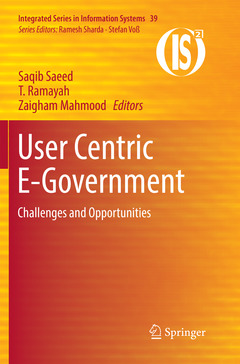Description
User Centric E-Government, 1st ed. 2018
Challenges and Opportunities
Integrated Series in Information Systems Series, Vol. 39
Coordinators: Saeed Saqib, Ramayah T., Mahmood Zaigham
Language: English
Subject for User Centric E-Government:
Publication date: 08-2018
Support: Print on demand
Publication date: 10-2017
Support: Print on demand
Description
/li>Contents
/li>Biography
/li>Comment
/li>
This book provides user studies and theories related to user-centered technology design processes for e-government projects. The book mainly discusses inherent issues of technology design implications, user experiences, and guidelines for technology appropriation. Ethnographic studies focusing on real life examples will enable readers to understand the problems in an effective way. Furthermore, the theories and results will help researchers and practitioners to handle these challenges in an efficient way.
E-Government is about harnessing the information revolution to improve the efficiency of government processes and the lives of citizens. It aims at a citizen centered approach to governance through effective use of the Internet and Information and Communication Technologies (ICTs). E-Government promotes transparency and effectiveness of a government?s processes as well as citizens? participation (e-participation) in the affairs of the government. Whereas E-government projectsare huge undertakings for government departments, a user-centric approach requires citizens? participation in the design and delivery of e government services. In both these respects, there are huge challenges and governments require long term commitment as well as correct planning and availability of financial resources to address them.
System design for e-governmental applications is inherently a complex process. In successful e-government projects, appropriately designed technology infrastructure plays a pivotal rule. The technology appropriation process requires that e-government technologies should be in line with the work practices of end users, so that successful usage of these technologies can be realized. E-governmental systems which fail to take into account such human factors result in failure and wasting huge amounts of public money as well as a loss of confidence of the public in such technological infrastructures. It is highly important that citizens are enabled to have access to the appropriate information technology, have knowledge and skills to use the available technology, and have the positive commitment to affect the governments? strategies. So, enabling citizens to effectively participate is much more difficult. This book addresses these inherent challenges and available opportunities with respect to user-centric e-government.
Chapter 1. The Challenges in Implementing E-Democracy in the United States.- Chapter 2. Exploring the Emergence of Open Spatial Data Infrastructures: Analysis of Recent Developments and Trends in Europe.- Chapter 3. Improving Domestic Revenue Mobilisation in African Countries Using ICT: A Literature Review Analysis.- Chapter 4. A Method to Evaluate E-Government Service Quality Attributes.- Chapter 5. Trust in the System: The Mediating Effect of Perceived Usefulness of the E-Filing System.- Chapter 6. Administrative Efficiency and Effectiveness with the Application of E-Government.- Chapter 7. Agile Collaborative Architecture for the Development of E-Government Services in Romania.- User Centric Services under the Web 2.0 Era.- Chapter 9. Towards User Centric E-Government.- Chapter 10. Enacting Digital Government Services for Noncitizens.- Chapter 11. The 'Engage' System: Using Real-Time Digital Technologies to Support Citizen-Centered Design in Government.- Chapter 12. Play It to Plan It? The Impact of Game Elements on Usage of a Urban Planning App.- Chapter 13. Usability Evaluation of the Mobile Application of Centralized Hospital Appointment System (CHAS).
Saqib Saeed is an assistant professor at the Computer Science department at Imam AbdulRahman Bin Faisal University Dammam, KSA. He has a Ph.D. in Information Systems from University of Siegen, Germany, and a Master’s degree in Software Technology from Stuttgart University of Applied Sciences, Germany. Dr. Saeed is also a certified software quality engineer from American Society of Quality. He is a member of advisory boards of several international journals besides being guest editor of several special issues. Dr. Saeed’s research interests lie in the areas of human-centered computing, computer supported cooperative work, empirical software engineering and ICT4D and he has more than 50 publications to his credit.
T. Ramayah is currently a Professor at the School of Management in USM. He teaches mainly courses in Research Methodology and Business Statistics and has also conducted training courses for the local government (Research Methods for candidatesdeparting overseas for higher degree, Jabatan Perkhidmatan Awam). Apart from teaching, he is an avid researcher, especially in the areas of technology management and adoption in business and education. His publications have appeared in Computers in Human Behavior, Resources Conservation and Recycling, Journal of Educational Technology & Society, Direct Marketing: An International Journal, Information Development, Journal of Project Management (JoPM), Management Research News (MRN), International Journal of Information Management, International Journal of Services and Operations Management (IJSOM), Engineering, Construction and Architectural Management (ECAM) and North American Journal of Psychology. Having his contributions in research acknowledged, he is constantly invited to serve on the editorial boards and program committees of several international journals and conferences of repute. In addition, T. Ramayah has collaborated with noted companies from various disciplines of business




